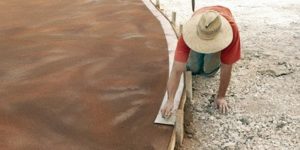 Do you really know what you are doing?
Do you really know what you are doing?
Seriously, are you successful because of your knowledge, or are you successful in spite of your lack of knowledge, or successful because of your competition’s or your customer’s lack of knowledge? When you are part of a new industry, which polished concrete still is, it’s easier to bluff your way through a conversation or job.
Did I ever bluff my way into or out of a spot? Yes, I did. In fact, if you haven’t, then you’ve probably led an extremely conservative life, and that usually translates into slow growth or no growth. I’m not encouraging lying, cheating, or intentionally misdirecting your customer or your employees. Instead, I’m encouraging an attitude that says, “I’m going to be at the forefront. I’m going to try to solve that problem that has stumped everyone else.” Learning, experimenting, being the first — these are keys to moving ahead. Now again, I ask you, “Do you really know what you are doing?” Hopefully your answer is, “Not always, but I’m going to find out.”
I’m a person who loves to read, listen and learn, and to experiment. One time I took a manufacturer’s full line of acid stains and created every possible 50/50 combination of their product. Why did I do this? Was it because I was curious? For all intents and purposes, there are truly only eight colors available in acid stains, but everyone is always asking “what if,” so I tried. Was I successful? Not in the sense of discovering a breakthrough, but yes in the sense of increasing my understanding of acid stains. For instance, unlike dyes that can be mixed and overlaid upon each other, an acid stain works using metallic salts that undergo a chemical reaction. This eliminates the ability to mix and match or to gain a predetermined result by mixing two acid stains. For the record, out of more than 30 combinations of acid stains that I mixed and applied, I did not gain even one viable new color.
Importance of investment
In today’s economy, it is even more important to make an investment in the bank. In this case I’m not referring to money in the bank, though that is important. I’m referring to building your knowledge bank in your brain.
Following Michael Phelps’ eighth gold medal in Beijing, he and his coach Bob Bowman talked about “putting money in the bank” every day and building that reserve for some special point in the future. For Phelps that paid off in an unheard-of eight gold medals. For you, that can turn out to be an epiphany on how to approach, sell or solve a job. It is okay to listen to others, and it is good to let others be the ones to reinvent the wheel — at times. In fact, one of the greatest satisfactions that I receive from my job is in helping others learn without paying the same “tuition” that I did. But that is different from resting on your laurels, expecting others to do everything for you.
Building your knowledge bank in your brain is the most effective means for you to define your edge. Your competition has access to the same equipment, chemicals and diamonds that you do, but they don’t have 24/7 access to your bank, your mind. Working smart means that you have identified your strengths and weaknesses, and that you will grow your business accordingly. Earlier I referred to slow growth or no growth. Am I implying that slow growth is bad? Not if it is part of a conscious, educated decision. Rapid growth can be as devastating, or worse, than no growth. If you really know what you are doing, what your competitor is doing, and what you are capable of, then you have defined your edge.
Myth of the Month
The least expensive equipment, chemical or diamond means a more profitable job.
FALSE. It is important to know your true costs. Low upfront costs can very often lead to higher long-run costs, which in turn leads to lower profits and/or lost opportunities. Is a piece of equipment less costly if it breaks down more often, or if you have to wait for parts? Is a chemical more cost-effective if the performance you receive leads to unhappy customers or increased failures? Also, is a lower-cost diamond in fact lower-cost if the diamonds fail to open the floor or wear out more quickly? Be knowledgeable in your buying decisions. Know that lower cost can just as easily mean costlier as it can mean more cost-effective.
Success Checklist for Building Your Knowledge Bank
When you analyze your position in the marketplace, asking those questions will help assure your success:
- Are you capitalized adequately?
- Do you know your true costs? Is your spending under control?
- Do you have control of your receivables?
- Do you know your market? Your competition?
- Are you capable of delivering what you’ve promised?
- Should you partner with a competitor instead of investing in new equipment that may be underutilized?
- Are you and your employees trained properly?
- What other markets can you explore?
- Are you excited and hungry for success?
A knowledgeable “no” can be as important as a knowledgeable “yes” — and more important than a misguided “yes.”















